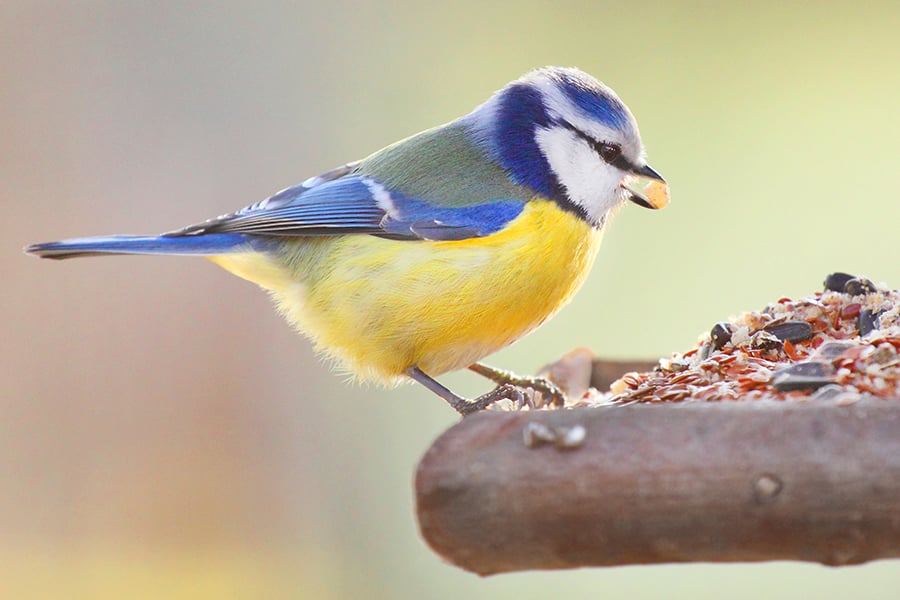The Best Wild Bird Foods for your Garden This Summer
Summer is a wonderful time of year to feed your garden birds.
Most of our native UK birds are in full plumage during the early summer months so there’s plenty of opportunity to see bright reds, blues, yellows and greens flitting about in trees.
During the summer, wild birds are looking to load up on foods that are high in energy and protein so here you’ll find our recommendations on what to feed your garden birds this summer.
A High-Quality Seed Feeder Mix
There are plenty of options when it comes to seed feeder mixes but there are a few key ingredients to look out for.
Try and avoid seed mixed with a high volume of wheat. Wheat offers very little in the way of nutrients for wild birds and is mostly consumed by pigeons and magpies – having these larger birds in your garden can deter the smaller birds.
Look for mixes that contain quality ingredients like oatmeal, peanut granules, sunflower hearts or chips and other high carbohydrate and protein seeds like red dari and safflower seeds. Other great ingredients to look out for are suet pellets and dried mealworms; both of which offer considerable energy for wild birds.

Sunflower Hearts and Black Sunflower Seeds
Sunflower hearts and black sunflower seeds are fantastic to feed during the summer as they’re high in healthy oils and protein, providing wild birds with plenty of energy.
The only difference between the two types of seed is the husk. Black sunflowers still contain their hard, outer shell. Smaller birds may struggle picking the husks off, however, it’s not a problem for bigger birds who are still able to get to the sunflower heart inside. Removing the husks can cause a little mess in your garden but your birds will still get the same benefits as using plain sunflower hearts.
For growers, a lot of work goes into de-husking black sunflowers in order to produce sunflower hearts. For this reason, hearts tend to be slightly more expensive but worth the cost if you want a bigger array of birds and no mess.

Worms and Insects
During the spring and summer months, birds don’t struggle to find creepy crawlies to feast on, including; earthworms, caterpillars and even ant larvae.
However, extreme changes in the weather during these months can cause a shortage in insects and including these kinds of foods in your garden can be a great help.
Live mealworms, dried mealworms, crickets, waxworms and calci worms are all readily available online and are great sources of protein for wild birds. For a more cost-effective way of feeding worms, you can buy them dried or dehydrated. You can simply rehydrate them by soaking them in warm water for 30 minutes before you use them to soften them up and increase their water content.

Robin eating ant larvae
Suet Pellets and Suet Balls
There are plenty of ways you can feed suet products during the summer months. Most commercially made suet balls are produced to withstand mild heat and if you already have a selection of birds visiting your garden, you shouldn’t need to worry about them going bad before they’re eaten.
With suet pellets, try simply sprinkling the pellets onto the ground or on a table rather than using a feeder. This lessens the risk of them sticking together in a feeder due to heat but still allows plenty of garden birds access to them.
During the summer, remember to clean up any suet waste if it’s still there within a few days.

Ground Feeding Mixes
If you don’t want to invest in hanging seed feeders or don’t have the space for a dedicated bird feeding station in your garden, ground mixes are perfect.
Look for mixes that contain ingredients like raisins or dried apricot (a dog friendly option), peanuts, sunflower hearts and suet pellets. Cheaper mixes that contain a high volume of shelled seeds, wheat and millet often result in mess and waste and can end up being poor value for money.
Mixes specifically produced for ground feeding are usually heat treated to make sure the seeds won’t germinate and cause unwanted growth in your garden. This means you’re free to sprinkle them anywhere you like; on grass, flower beds and under bushes are all great spots for ground feeding birds.

To find out more about Ivel Valley Bird Food, our solar-powered Bedfordshire farm and homemade products, visit www.ivelvalleybirdfood.co.uk
Click here to receive 15% discount when you spend £50 with Ivel Valley Bird Food.
By Ivel Valley Bird Food





















